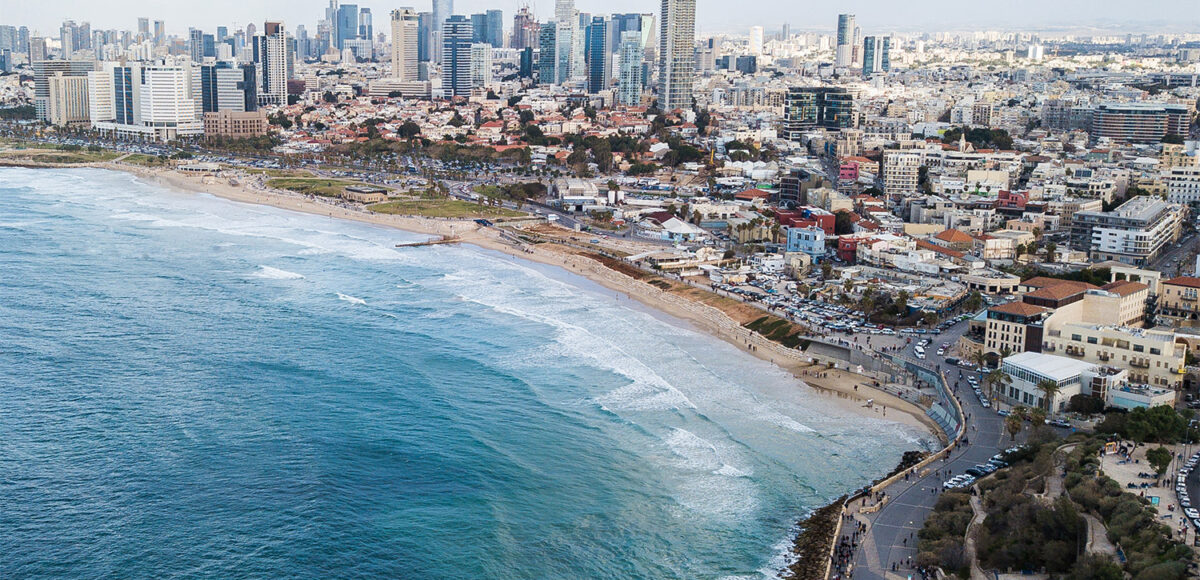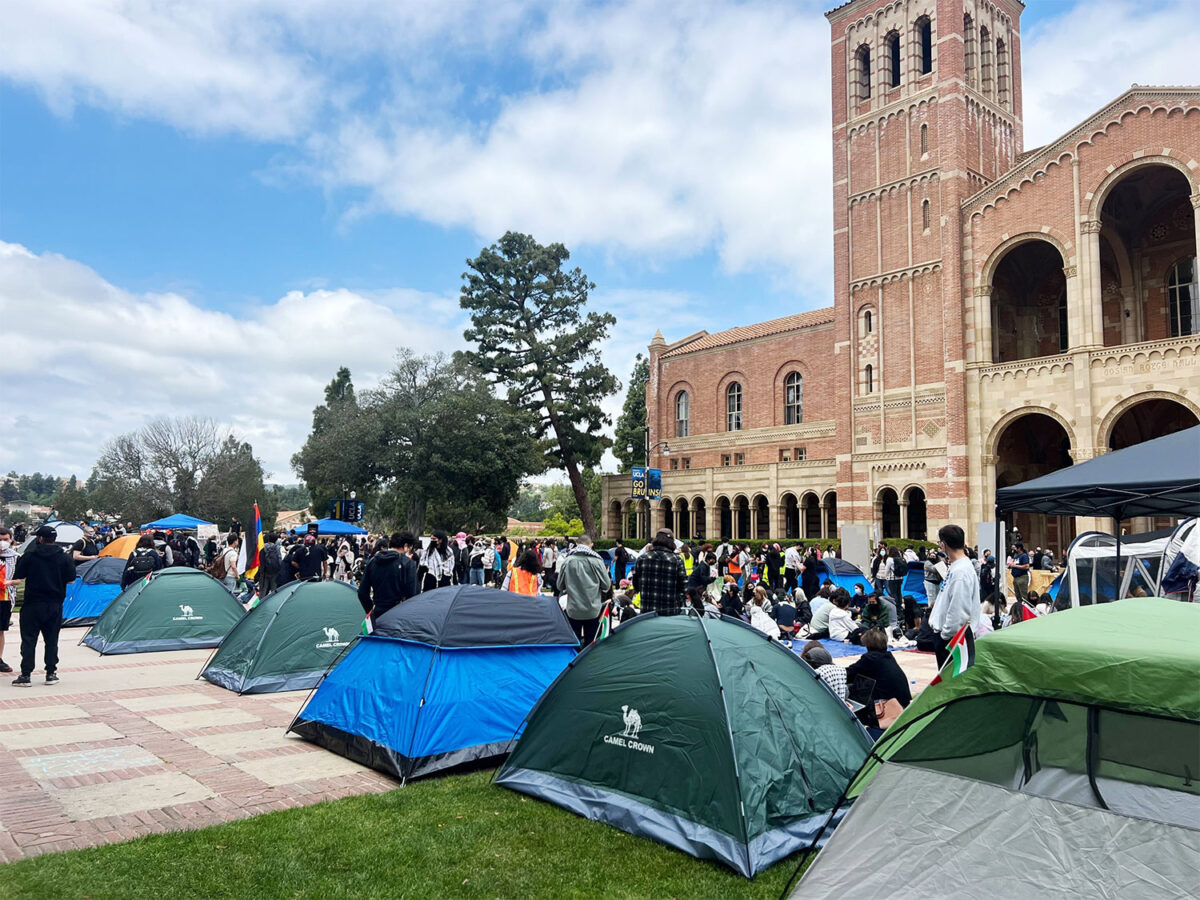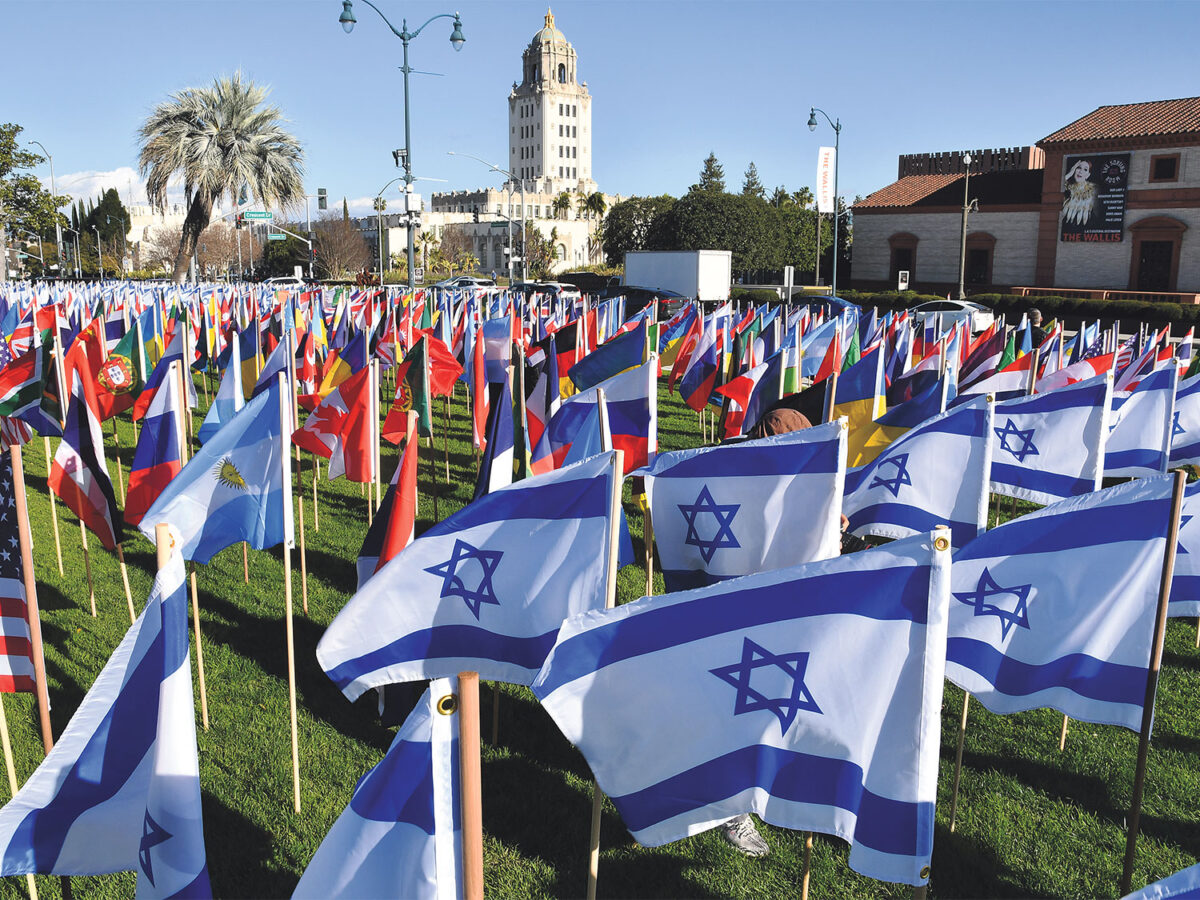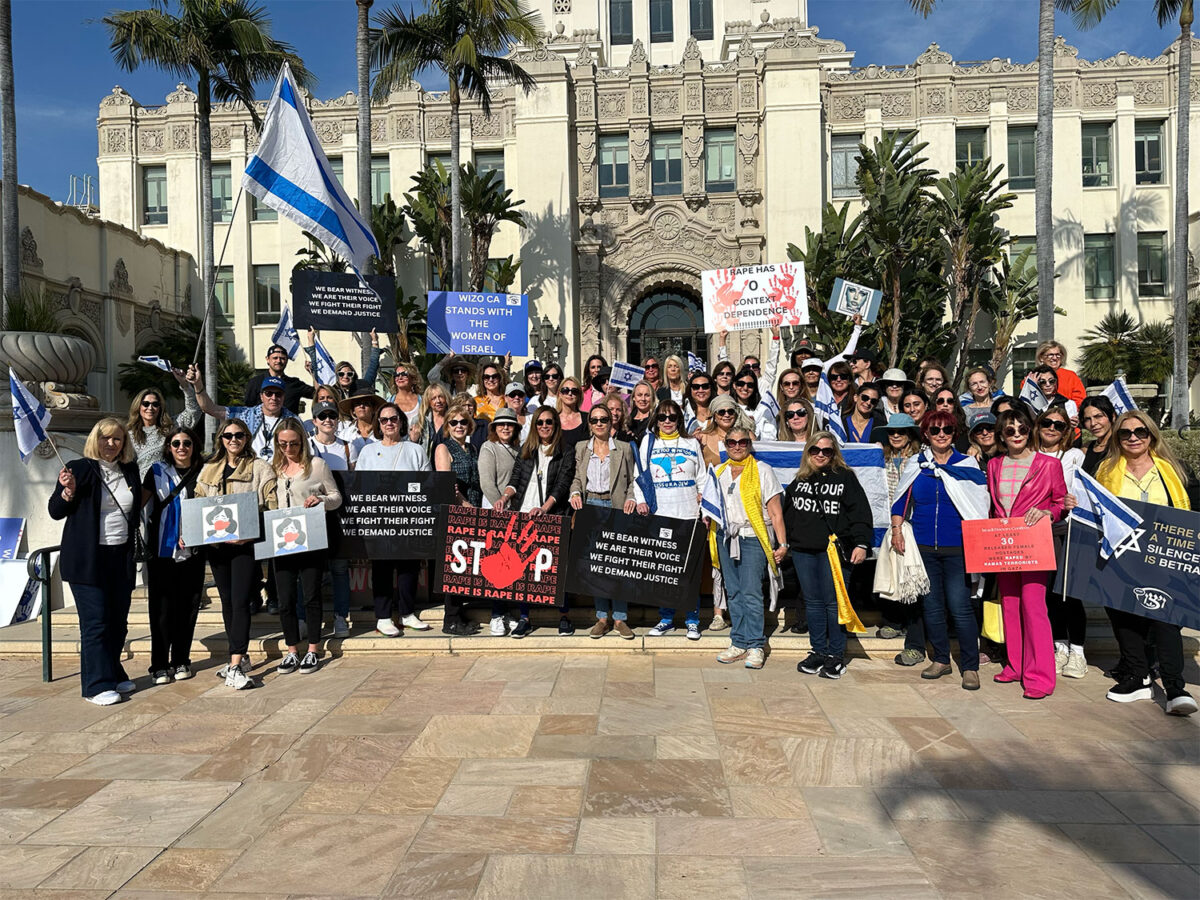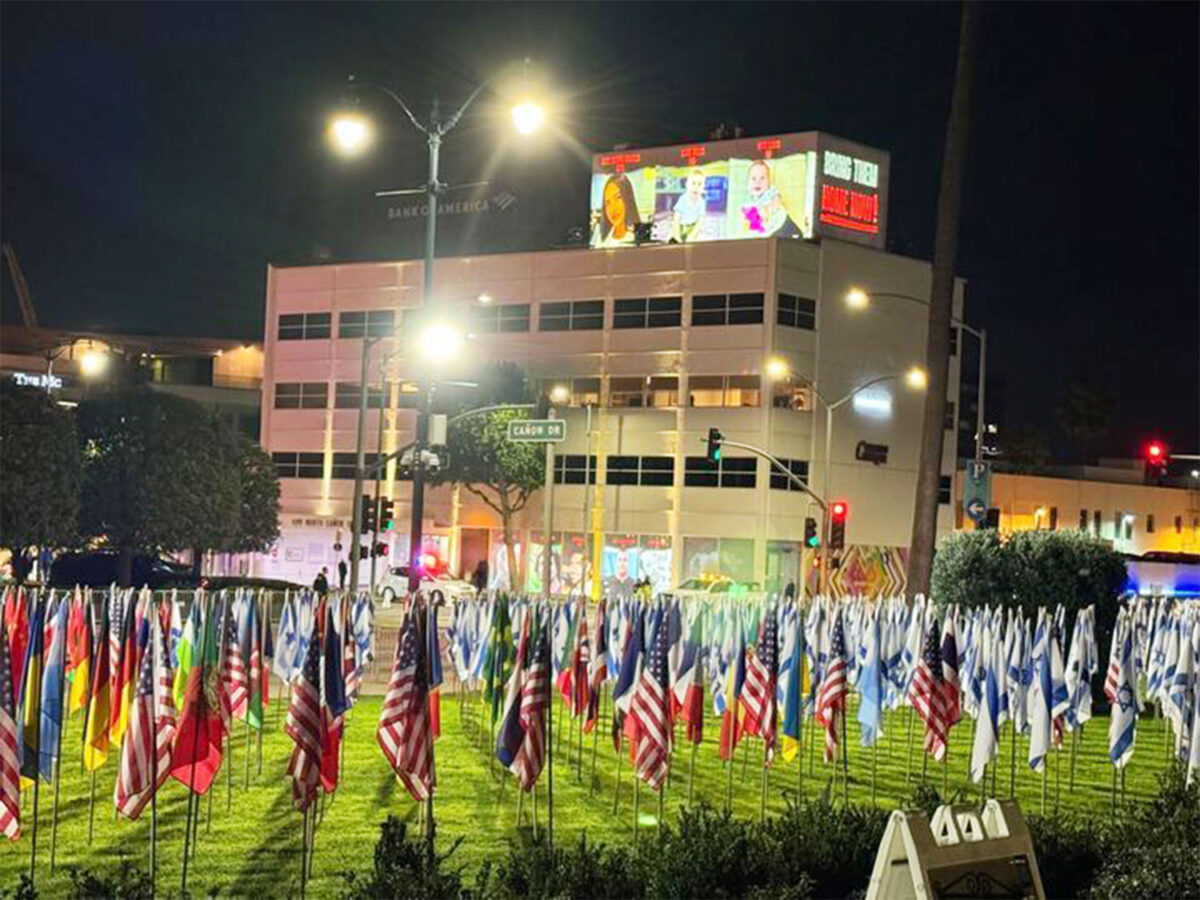I recently returned from Israel. I traveled with 15 other rabbis from all over the Los Angeles area. We went for one simple, important reason: to bear witness and see the horrors of Oct. 7 with our very own eyes. As the United Nations pathetically wavered in its stance on condemning the rape and mutilation of Israeli women by Hamas and as the world watches heads of elite U.S. universities unable to decry expressions of Jewish genocide on college campuses, bearing witness is an action we can’t afford not to take.
And yet, as a rabbi who just took 40 congregants to Israel this past July, I never expected to see such a drastically changed Israel. Over the summer, we experienced a post-COVID Israel. A bustling airport with tourists arriving all over to enjoy an Israeli summer. Restaurants and shops packed with tourists waiting to eat authentic Israeli cuisine. Jews visiting the Kotel to celebrate their b’nai mitzvah and Christians wading through the Sea of Galilee to conduct ritual baptisms. But this week, I witnessed an Israel I had never hoped to meet: an Israel in a state of brokenness. An Israel that will need all of us if she wishes to rise from the ashes.
In my short three-day trip, the Jewish Federation of Greater Los Angeles arranged meetings with Israelis from various sectors: conversations with hostage families, heads of IDF bases, displaced evacuees from the north and south, doctors and nurses, mental health clinicians, educators, Israeli rabbis and more. In my free time, I spoke with family members who have sons and grandchildren serving in Gaza and on the border with Lebanon. The emotional weight Israelis are carrying sits heavily in their eyes and eloquently upon their lips. In one way or another, each Israeli expressed to me: we are scared. There is a fear that many of us who live outside of Israel have never heard before. Usually, Israelis will remind us that they live with fear every day. Surrounded by Arab nations, constantly aware of Iran’s control through Hamas and Hezbollah, having lived through thousands of years of demonization, Israelis know fear. But this was different. This is an Israel that turns to all of us and asks us to pray with her, to stand with her as each citizen stays up through the night, quaking with uncertainty, trembling with angst.
A few examples of my conversations:
We met Benzi at Shura IDF Military Base, the site where the civilians and IDF soldiers’ dead bodies of Oct. 7 were identified and prepared for burial. This young IDF soldier began our tour with a confession. Benzi explained that in his years of IDF service, he was never in combat. He dealt with other matters in the IDF. When he was called back to serve on Oct. 8, he could never imagine being in charge of identifying and burying hundreds of people. In fact, he said before this point in time, he had never touched a dead body. Yet, here he was, responsible for laying all these bodies to rest in holy burial. Some so decimated and burned, identification is nearly impossible. He looked at us and asked the rabbis to go back to our congregations to pray for his soul. At one point, he stopped our tour and told us that during the first few days of the war, he questioned his own mental health because he had yet to cry. When he finally saw a young mother identify her murdered son, he felt tears run down his cheeks. He was comforted by his tears but afraid for his future. He doesn’t know how he will return to “life” after the war.
We met Moira and Amos, two evacuees representing the almost 300,000 Israelis displaced from northern and southern Israel. With so many kibbutzim homes virtually destroyed near the Gaza envelope and the north on the verge of attack from Hezbollah, Israeli civilians are in a constant state of uncertainty. Many live in hotels, sometimes 5-7 people packed in one room, trying to maintain some kind of routine within the chaos of their lives. Moira just wants to return to her beautiful home in Netiv HaAsara—the home she and her husband have created memories for 40-plus years. However, there is no indication when Moira can go home. It may be up to two years before she can live comfortably, with real security on the border. The kind of security that will reassure her that events like Oct. 7 will never happen again. She is angry. She is petrified. At one point she looked at all of us and wondered if anything will ever help her situation or if she will continue to live in this state of fury. Amos, a father of two teenagers knows his children are traumatized. He wants his family to eventually return to his kibbutz, but his children are not ready to have the conversation. Perhaps they’ll never be ready. He explained that the charm of Israel is feeling safe enough to have your children play on the beach and on playgrounds, knowing that the greater Israeli village will help raise and shepherd your children. Since Oct. 7, the idyllic kibbutz life has shattered. For how does a father force his children to return to a home on the Gaza border, once a place of refuge, now a place associated with nightmares and broken trust? And beyond the emotional ramifications, if evacuees cannot muster the resilience to return to their homes, who pays their rents? Mortgages? A changing economy is something we cannot ignore.
I spoke with my Israeli cousin whose home life has vastly changed in the past 60 days. Her husband is stationed in the north, surveying the situation in Lebanon. She has another son stationed somewhere in the south who is unable to share exact details of where he is and what he is doing. Her daughter gave birth on Oct. 10 and her son-in-law, stationed primarily in Gaza, has seen his newborn daughter three times. A woman of exemplary strength, she implored me to take her story home to the States and remind everyone: the fear Israelis are experiencing isn’t localized to the border with Gaza. Israelis are scared all over the country and need to know they are not alone.
The Israel I witnessed this week may never fully return to the Israel I experienced this summer. However, glimmers of hope encouraged me that Israel will take control of the currently bleak narrative. During our trip we traveled down to Kfar Aza, a kibbutz about a mile away from the Gaza Strip. Nine hundred people lived in Kfar Aza, which is known for its famous kite festival. One family organized the festival and asked neighbors to create kites with messages of peace and love. Each year, they would fly these kites towards Gaza to show their intentions of building bonds and partnerships. The festival was planned for Oct. 7. But this year, sadistically, Hamas terrorists stormed through Kfar Aza, flying through the air on paragliders and driving on land on motorcycles. Fifty-eight members of Kfar Aza were murdered,17 taken hostage and six severely injured. She tearfully shared that the exact family that initiated the efforts of the annual kite festival was found murdered in their beds, their kites in the living room still waiting to be flown. And even through her sharing of this hell, she turned to us and wondered aloud how her Kfar Aza will one day transform back to a place of kite flying, a symbol of peace.
I saw glimmers of hope in our visit to the Shamir Medical Center with leading experts in the brain’s response to hyperbolic chambers. The neuroscientists explained that the brain is capable of tissue regeneration and Israel is exploring what brain growth and repair might look like after experiencing traumatic events. This is an Israel that may feel broken, but this is an Israel that is beyond determined to provide a safe haven of Jewish tradition and innovation.
But Israel won’t adapt alone. As the Talmud says, “Kol Yisrael Arevim Zeh BaZeh—all of Israel is responsible for each other.” While the Talmud may be referring to the Jewish people, this war is impacting all people of faith. This is the moment to expand the phrase to understand that we are responsible for all of humanity. Hamas declared war on all peace-seeking people. Israel is a land of varied religions and cultures. It is home to Muslims, Christians and Jews. On Oct. 7, all human life was targeted. The hostages represented major world religions. Nationalities of the hostages include Thai, Chinese, Russian, French, German and Argentinian. I call on all leaders of faith and the moral majority that I know exists in the United States to stand together as one interwoven, impenetrable heart. Be vocal and resolute. Call out evil. Stand against Hamas. Our descendants will take note of where we stood, where we spoke out and when we were silent. And our brothers and sisters in Israel are listening.
Rabbi Nicole Guzik is Senior Rabbi at Sinai Temple. Her vision is to create multiple paths for Jewish engagement and avenues to deepen Jewish identity. Rabbi Guzik focuses on creating innovative women’s programming at Sinai, and as an Associate Marriage and Family Therapist (AMFT), Rabbi Guzik launched the Sinai Temple Mental Health Center in August 2021 to address the mental and emotional health of the Sinai Temple community and beyond. The Sinai Temple Mental Health Center destigmatizes conversations around mental health and provides opportunities for members to address life’s challenges and obstacles together. With her AMFT, Rabbi Guzik also provides premarital counseling to Sinai Temple members.



